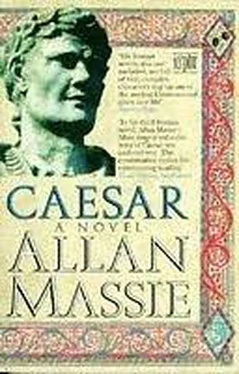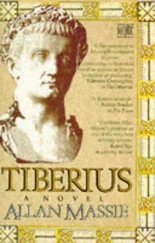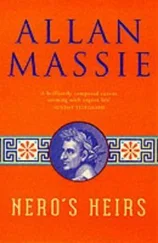Allan Massie - Caesar
Здесь есть возможность читать онлайн «Allan Massie - Caesar» весь текст электронной книги совершенно бесплатно (целиком полную версию без сокращений). В некоторых случаях можно слушать аудио, скачать через торрент в формате fb2 и присутствует краткое содержание. Жанр: Исторические приключения, на английском языке. Описание произведения, (предисловие) а так же отзывы посетителей доступны на портале библиотеки ЛибКат.
- Название:Caesar
- Автор:
- Жанр:
- Год:неизвестен
- ISBN:нет данных
- Рейтинг книги:3 / 5. Голосов: 1
-
Избранное:Добавить в избранное
- Отзывы:
-
Ваша оценка:
- 60
- 1
- 2
- 3
- 4
- 5
Caesar: краткое содержание, описание и аннотация
Предлагаем к чтению аннотацию, описание, краткое содержание или предисловие (зависит от того, что написал сам автор книги «Caesar»). Если вы не нашли необходимую информацию о книге — напишите в комментариях, мы постараемся отыскать её.
Caesar — читать онлайн бесплатно полную книгу (весь текст) целиком
Ниже представлен текст книги, разбитый по страницам. Система сохранения места последней прочитанной страницы, позволяет с удобством читать онлайн бесплатно книгу «Caesar», без необходимости каждый раз заново искать на чём Вы остановились. Поставьте закладку, и сможете в любой момент перейти на страницу, на которой закончили чтение.
Интервал:
Закладка:
"Very well," Caesar said, "if Cato insists I shall let him see the note, but I protest that it should go no further."
"I shall decide that," Cato replied. So Caesar passed him the note, which was a love-letter from Servilia, couched in extremely explicit terms.
I have often heard Caesar tell that story.
Then the matter of Servilia's son, my cousin Marcus Junius Brutus, also came between them. This seems strange when you consider how dull Markie is, but Caesar and Cato competed to exercise influence over him, each affecting to think him the coming great man, a model of virtue. It was absurd; nevertheless that was how they felt. Of course there have always been rumours that Markie was Caesar's son, and I know that sometimes at least Caesar liked to think that this was so. Absolute nonsense, as my mother assured me: Markie was the very image of his extremely dull father. Cato of course was horrified at the suggestion. It seemed to me that he half-believed it, however, and was convinced that if he could attach Markie to himself, this would disprove the story. Be that as it may, it was quite a comedy to see the pair strive for the boring young man's approval and devotion. As for Markie, he took the competition for granted; even as a youth he was so puffed up with conceit that it appeared perfectly natural to him that two of the great men in the State should vie for his confidence and approval. Can you imagine anything more ridiculous?
He inclined towards his uncle who appealed to his dull taste and his antiquated notions of Republican virtue. If you ask me, he was always a little afraid of Caesar, partly because his pedestrian intelligence found it difficult to follow the leaps of Caesar's conversation; and he was of course shocked by the audacity of Caesar's speculations. Besides, he was ashamed of his mother's affair with Caesar, and not even Markie could convince himself, despite the rare ability he has always had to believe exactly what he chooses, that they were only good friends. On the other hand, like most people, he couldn't resist Caesar's famous charm, and even Markie couldn't fail to find Caesar a much more agreeable companion than Cato. So he succumbed to Caesar whenever he was present and rebelled against him in his absence.
Cato worked hard to persuade him that Caesar was fundamentally evil, as well as being a danger to the Constitution which they both adored. So at the beginning of the civil war, Markie attached himself to the respectable party and followed Pompey to Greece. No doubt he thought Pompey would win; that, after all, was the received opinion among those who underestimated the magnitude of what Caesar had achieved in Gaul. Markie's decision to join Pompey was clear evidence of Cato's influence, for Servilia detested the Great One, because he had been responsible for the death of her first husband, Markie's father.
He didn't distinguish himself during the campaign which ended at Pharsalus; Markie has no more notion of soldiering than I have of rope-dancing. Indeed, though Pompey had proclaimed himself delighted to receive such a virtuous young man, he had taken care to give him no responsibility. Pompey may have been in decline, but he still knew better than that.
Caesar of course was delighted to make Markie one of the most conspicuous objects of his clemency. He even ordered us to save him by all means, and if he refused to surrender, to let him escape. In fact he was one of the first to run away, and spent a couple of days skulking among the reeds at the edge of a marsh. Then he got to Larissa whence he wrote to Caesar in the most friendly terms. Caesar at once invited him to join us.
I was in Caesar's tent with Casca when he arrived, and we found the whole thing nauseating. First, Caesar dissolved in tears, saying again and again that his one fear during the battle had been that the noble Brutus might be slain.
("Fat chance of that," Casca whispered. "I bet he was safe in the rear." And indeed, I later heard that he had spent the day of the battle writing an essay in his tent, till slaves brought him the news of defeat and he ran away.)
Then Caesar kissed Markie, and wept some more, and Markie wept too, and begged Caesar's pardon, and excused himself by saying that he had been under his uncle's influence. It was a ludicrous scene. I have attended many such, but I can't recall one more absurd.
The upshot of it all was that Caesar soon appointed Markie Governor of Cisalpine Gaul. Casca remarked that while Caesar might be besotted, his judgment hadn't entirely deserted him. Cisalpine Gaul was then one province where we could be sure there would be no fighting. Markie at once set himself to win popularity with the people under his jurisdiction, but he took care to remind them that all their blessings were obtained as a result of the goodness of Caesar.
Caesar was now eager to proceed with the African campaign.
"It gives me a chance to settle Cato's hash for good," he said. "That is essential, for you see, Mouse, as long as he is at liberty, opposition will continue. He is a festering boil, which must be lanced."
I agreed with him entirely.
Despite his desire for speed, certain matters held him in Rome.
The first, and most grievous, was a mutiny by his favourite Tenth Legion, then stationed at Capua. They had grounds for complaint. Their pay was even further in arrears than is usual in armies. Some, whose term of service had expired, had been denied demobilisation. Land promised to veterans had not yet been assigned. So both their present state and their future prospects were unsatisfactory, and now they learned that they would be required to embark for Africa. Agitators, recruited in my opinion by Caesar's enemies in the Senate, infiltrated the camp and found the tinder dry. Accordingly a committee was formed — as committees always are in such circumstances. The officers were arrested and bound in chains, as officers always are unless they have the wit to run away; and the men talked about marching on Rome, determined to lay their grievances before Caesar and demand redress. It was a nasty moment. It was clear to me that if Caesar should fail to suppress this mutiny, everything for which we had worked, fought and suffered would be destroyed. I am told that when the news of the mutiny reached Cato in Africa, he not only ordered that it should be published throughout his camp (in itself an act of extraordinary folly, since mutiny is as contagious as an outbreak of rioting in a city), but went happily drunk to bed, and stayed drunk for two days. He deserved to have his throat cut for being such a blockhead. However, he got away with it for the time being.
Caesar, as I have said, was at his best and most masterful in the hour of crisis. Calm weather did not suit him; storms aroused and stimulated his genius. He tried to temporise with the mutineers, sending young Sallust, an officer whom he held in more respect than I did, to the camp near Capua, with authority to promise substantial sums of extra pay. Sallust wasn't even accorded a hearing, being met with a volley of stones and insults, which persuaded him that his life was in danger. He therefore fled back to Rome.
It was soon after this that the legionaries themselves moved north. Other troops had been attached to their unworthy cause, and the danger was indeed very great. The excitement in Rome was immense, especially among our enemies who went about promising each other that Pompey was going to be avenged, and that it would soon be possible to restore what they described as "Republican normalcy". Their excitement wasn't even allayed by the news that the mutineers had sacked properties on their march and murdered two men of praetorian rank. The ordinary citizens took a different view, and a more sensible one. They were frankly terrified and looked to Caesar to protect them.
Читать дальшеИнтервал:
Закладка:
Похожие книги на «Caesar»
Представляем Вашему вниманию похожие книги на «Caesar» списком для выбора. Мы отобрали схожую по названию и смыслу литературу в надежде предоставить читателям больше вариантов отыскать новые, интересные, ещё непрочитанные произведения.
Обсуждение, отзывы о книге «Caesar» и просто собственные мнения читателей. Оставьте ваши комментарии, напишите, что Вы думаете о произведении, его смысле или главных героях. Укажите что конкретно понравилось, а что нет, и почему Вы так считаете.












